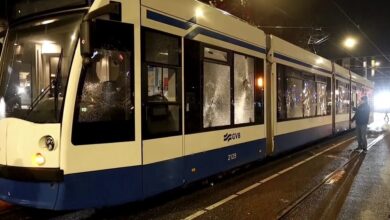Black police vehicles with flashing lights rush by in front of the Organized Crime Court in Belgrade. The accused are brought into the building through the back entrance. There are 31 men accused, among other things, of murder, drug possession, kidnapping and arms trafficking.
In the courtroom, they sit behind safety glass, just an arm’s length away from the visitors: muscular builds with bull’s neck, bald heads, tattoos. The head of the gang is Veljko Belivuk, hooligan leader of Partizan Belgrade, a club known for an aggressive fan base with deep ties to organized crime.
They are said to have committed the crimes they are accused of for a drug clan with roots in Montenegro, which has been fighting a bloody war with other clans for years – with numerous murders not only in Serbia but in several European countries.
Brutal Murders
The Partizan hooligans are among the most brutal in Europe. The stadium serves as a drug hub and recruitment site for new gang members. Now they are charged with several bestial murders.
When international investigators decoded the encrypted news service Sky ECC in early 2021, they came across gruesome photos of mutilated corpses. The trail leads to a house in a village outside of Belgrade with a hidden room that can only be reached through a hole in the wall. In it, among other things, a meat grinder, through which the criminals turned the corpses in order to dispose of them afterwards.
Work for the President
The trial in Belgrade is now bringing this group’s ties to politics to light. Investigative journalist Stevan Dojcinovic has been following the trial against the clan since the beginning.
During the trial, Belivu explained “that it was his role to support demonstrations for (Serbian President Aleksandar) Vucic and to disrupt opposition protests,” says Dojcinovic. “He listed political favors that Vucic asked him to do.”
Police officer as clan leader
The policeman Nenad Vuckovic, another leading representative of the hooligans, probably also played a leading role. He can be seen in a photo with the suspected multiple murderer Belivuk. However, the policeman did not control the group alone, the whole thing went much higher up, according to Dojcinovic.
In a leaked communication between Belivuk and the police officer, which is available to ARD, Belivuk writes that he fears no one and is ready. The policeman then replies that he knows that, the “boss” knows it too, as does the “big boss”.
For Dojcinovic it is clear that “boss” means the former interior minister and “big boss” means President Vucic. ARD inquiries to the head of state went unanswered. He also did not want to comment on allegations against his son Danilo. In one photo, Danilo Vucic poses in a tight embrace with a confidante of Belivuk, whom the police list as a member of the clan.
Gang members against protesters
The journalist Brankica Stankovic knows the scene well. Politicians take advantage of the well-functioning hooligan scene, she says: “They are organized and very capable of any abuse. They turn into angry hordes who submit to every call from the power structures, no matter what is on the agenda. ”
For example, at Vucic’s 2017 inauguration, protesters were removed by violent security personnel. One of the men has been identified as part of the Belivuk gang.
“Needs to talk about involvement with the state”
Stankovic has been researching the hooligan scene since 2009 and shows the connections to organized crime. In the stadium, she then becomes a hate figure. At a Partizan game against Shakhtar Donetsk, fans abused a Brankica doll, chanting called her a whore and threatened her with death. Since then she has lived under police protection.
That changed her life in an almost unimaginable way, says Brankica: “Everyday life is incredibly complicated and cumbersome. I stopped going out. For a while, 70 police officers took care of my safety. That was at a time when the police allegedly realized that a sniper rifle was purchased in the scene to kill me.”
She thinks the big court case against Belivuk’s gang is important. Nevertheless, Stankovic is convinced that nothing will change if you don’t uncover the structures behind it and finally talk about the entanglements with the state.
The bestial murders are now being processed. The accused are hooligans, the bosses of the Serbian underworld. Politicians or police officers have not yet been brought to justice.

 The Royal Mile is becoming increasingly dangerous
The Royal Mile is becoming increasingly dangerous Scholz speaks to Putin on the phone for the first time in two years
Scholz speaks to Putin on the phone for the first time in two years More riots in Amsterdam
More riots in Amsterdam